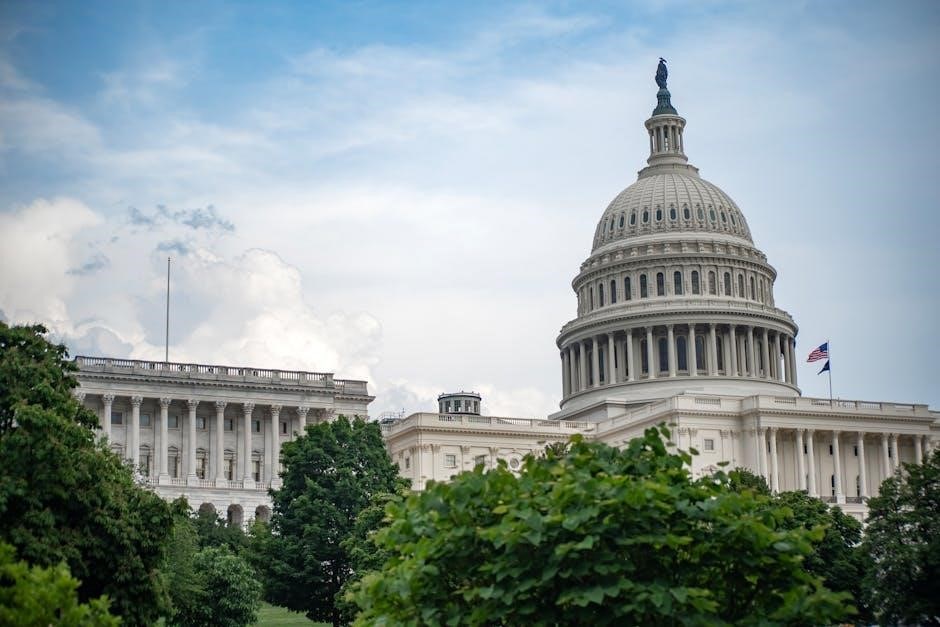Understanding the Concept of Limiting Government
Limiting government ensures power remains balanced, preventing tyranny․ The constitution, separation of powers, rule of law, consent of the governed, and minority rights act as safeguards․ iCivics resources explore these principles, fostering civic literacy and critical thinking․

Constitutional Limits on Government
Constitutional limits on government are foundational to ensuring power remains restrained and accountable․ A constitution outlines the framework of governance, defining the authority and boundaries of governmental institutions․ For instance, the U․S․ Constitution establishes the separation of powers and includes a Bill of Rights, protecting individual freedoms․ These limits prevent any single entity or branch of government from abusing power․ iCivics resources emphasize how constitutions serve as a cornerstone of democracy, providing a legal framework that binds leaders and ensures accountability to the people․ For example, the Fourth Amendment protects against unreasonable searches and seizures, illustrating how constitutional provisions directly limit governmental overreach․ Educating students about these principles fosters civic literacy and encourages active participation in preserving democratic values․ Through interactive tools and lesson plans, iCivics helps students grasp the importance of constitutional safeguards in maintaining a balanced and just system of governance․
Separation of Powers and Checks and Balances
The separation of powers divides government into three branches—executive, legislative, and judicial—each with distinct responsibilities․ This system prevents any single branch from dominating․ Checks and balances further ensure accountability, allowing each branch to limit the others’ actions․ For example, Congress can impeach the President, while the judiciary can declare laws unconstitutional․ These mechanisms are vital to preventing power concentration and protecting individual rights․ iCivics resources, such as lesson plans and simulations, teach students how these systems function․ The Fourth Amendment, safeguarding against unreasonable searches, exemplifies constitutional limits․ By understanding separation of powers and checks and balances, students grasp how government is designed to remain accountable and fair․ Interactive tools, like the Great State simulation, help them apply these concepts in real-world scenarios, fostering civic engagement and appreciation for democratic governance․
The Rule of Law and Its Role in Limiting Government
The rule of law is a fundamental principle ensuring that government actions are fair, consistent, and governed by established legal codes․ It prevents arbitrary decision-making and safeguards individual rights․ The Fourth Amendment, for instance, limits government searches and seizures, illustrating how laws constrain authority․ iCivics resources emphasize this concept, using simulations like the Great State to demonstrate legal frameworks in action․ By teaching students to apply legal principles, these tools foster an understanding of how the rule of law maintains accountability and justice․ This ensures that no individual or institution, including the government, operates above the law․ The rule of law is essential for democracy, as it protects citizens from abuse of power and upholds the legitimacy of governmental authority․ Through interactive learning, students gain insights into how legal systems function and why they are critical in limiting government overreach․
Consent of the Governed: The Foundation of Legitimate Authority
Consent of the governed is a cornerstone of democratic governance, ensuring that authority derives from the will of the people․ This principle, rooted in Enlightenment ideas, asserts that governments exist to serve the populace, not the other way around․ iCivics resources, such as the Great State simulation, explore how this concept operates in practice, enabling students to understand its significance․ Historically, figures like Thomas Paine championed this idea, arguing that colonial independence from Britain was justified because the government no longer represented the people․ Today, consent is expressed through elections, public opinion, and civic engagement․ It emphasizes accountability, as leaders must act in the people’s best interests or face consequences․ This principle limits government power by ensuring legitimacy is tied to the people’s approval, fostering trust and stability in democratic systems․

Protecting Minority Rights: A Key Limitation on Government Power
Protecting minority rights ensures that no group, whether racial, religious, or political, is marginalized or oppressed by the majority․ This principle is vital for maintaining justice and equality in a democratic society․ The Fourth Amendment, for instance, safeguards individuals against unreasonable searches and seizures, upholding personal freedoms․ iCivics resources, such as interactive scenarios, help students explore how government actions can impact minority rights․ Historical events, like the Montgomery Bus Boycott during the Civil Rights Movement, highlight the importance of protecting these rights․ By ensuring minority voices are heard, governments are prevented from abusing their power․ iCivics’ Great State simulation allows students to apply these concepts in fictional governance scenarios, fostering a deeper understanding of their significance․ Ultimately, protecting minority rights ensures that government authority remains fair, balanced, and accountable to all citizens, not just the majority․

Exploring the iCivics Answer Key PDF
The iCivics Answer Key PDF offers comprehensive resources, including study guides, lesson plans, and interactive tools, to help teachers effectively explain key civics concepts and government limitations to students․
Overview of the iCivics Curriculum and Resources
The iCivics curriculum and resources are designed to engage students in civic education through interactive and immersive learning experiences․ The program, founded by Justice Sandra Day O’Connor, offers a comprehensive approach to teaching civics, focusing on critical concepts such as the structure of government, constitutional principles, and civic participation․ The curriculum includes lesson plans, interactive games, and multimedia resources that align with educational standards․ Resources like the Limiting Government lesson plan provide students with a deeper understanding of the five key limits on government power: the Constitution, separation of powers, rule of law, consent of the governed, and minority rights․ Additionally, iCivics offers tools such as The Great State simulation, which allows students to explore the complexities of governance firsthand․ The platform also provides study guides, worksheets, and teacher support materials, making it a robust resource for civics education․ These resources are widely used in classrooms and are praised for their ability to make civics accessible and engaging for all students․
Key Concepts Covered in the Limiting Government Lesson
The Limiting Government lesson by iCivics focuses on five foundational concepts that restrict governmental authority․ These include the Constitution, separation of powers, the rule of law, consent of the governed, and protection of minority rights․ The lesson emphasizes how these principles ensure accountability and prevent abuses of power․ Students learn about the Constitution as the supreme law, limiting government actions through its framework․ The separation of powers among executive, legislative, and judicial branches is explored, highlighting how each branch checks the others․ The rule of law is introduced as a safeguard against arbitrary governance․ The lesson also explains the importance of consent, emphasizing that government derives its authority from the people․ Finally, it addresses how minority rights are protected, ensuring fairness even when the majority disagrees․ Through interactive activities and real-world examples, students gain a deeper understanding of these critical limitations on government power․
Applying the Five Limits to Government in Fictional Scenarios

The iCivics curriculum includes engaging activities where students apply the five limits on government to fictional scenarios․ These exercises help students understand how constitutional boundaries, separation of powers, the rule of law, consent of the governed, and minority rights function in practical contexts․ For example, students might analyze a hypothetical government where one branch holds too much power, exploring how checks and balances could restore equilibrium․ Another scenario might involve a law that infringes on minority rights, prompting students to propose solutions aligned with constitutional protections․ By interacting with these fictional cases, students develop critical thinking skills and gain a deeper appreciation for the importance of limiting government authority․ This hands-on approach ensures that abstract concepts become relatable and memorable, preparing students to engage thoughtfully with real-world civic challenges․ These activities are a cornerstone of the iCivics approach to fostering civic literacy and active citizenship․
Interactive Learning Tools: The Great State Simulation
The Great State Simulation is an innovative, interactive learning tool designed by iCivics to immerse students in the complexities of governance․ This dynamic simulation allows students to take on roles within a fictional state government, engaging in decision-making processes that mirror real-world legislative, executive, and judicial functions․ By participating in debates, proposing laws, and navigating political challenges, students gain practical insights into how governments operate and how the five limits on government—constitution, separation of powers, rule of law, consent of the governed, and minority rights—apply in action․ The simulation fosters collaboration, critical thinking, and problem-solving skills while reinforcing key civic concepts․ It also encourages students to reflect on the importance of checks and balances and the protection of individual rights․ Through this hands-on experience, students develop a deeper understanding of governance and civic responsibility, preparing them to engage actively in their communities․ The Great State Simulation is a cornerstone of iCivics’ commitment to fostering civic literacy through engaging, real-world applications of theoretical concepts․
Teaching Strategies for Effective Civics Education
Effective civics education requires engaging, interactive, and inclusive teaching strategies that promote active learning and critical thinking․ iCivics resources, such as the Limiting Government lesson, incorporate project-based learning, case studies, and simulations to immerse students in real-world scenarios․ Teachers can use discussion forums, debates, and role-playing activities to encourage collaboration and empathy․ Incorporating primary sources, such as historical documents and Supreme Court cases, helps students connect theoretical concepts to practical applications․ Differentiated instruction ensures that diverse learners can access and engage with the material․ Additionally, integrating technology, like the iCivics online platform, enhances student engagement and provides interactive tools for understanding complex civic concepts․ Regular formative assessments and reflective exercises help gauge student understanding and encourage deeper thinking about the role of government and individual rights․ By fostering a dynamic and participatory learning environment, educators can empower students to become informed, active citizens prepared to navigate the challenges of democracy․
Additional Resources for Teachers and Students
Beyond the core curriculum, iCivics offers a wealth of additional resources to deepen understanding of limiting government․ Teachers can access webinars, lesson plans, and interactive tools like The Great State Simulation, which immerses students in governance․ For students, worksheets, reading passages, and study guides, such as the Civics EOC Study Guide-KEY, provide comprehensive review materials․ The Limiting Government_StudentDocs․pdf from Park City High School and resources from FLVS․net further enhance learning․ These materials are designed to cater to diverse learning styles, ensuring engagement and retention․ Many resources are available for free, particularly for educators in specific regions, like Montana teachers․ iCivics’ nonprofit mission ensures accessibility, making high-quality civics education widely available․ These supplementary materials empower both teachers and students to explore complex civic concepts in-depth, fostering a stronger understanding of government limitations and their implications for democracy․ Visit the iCivics website or explore linked PDFs for more information and downloads;



